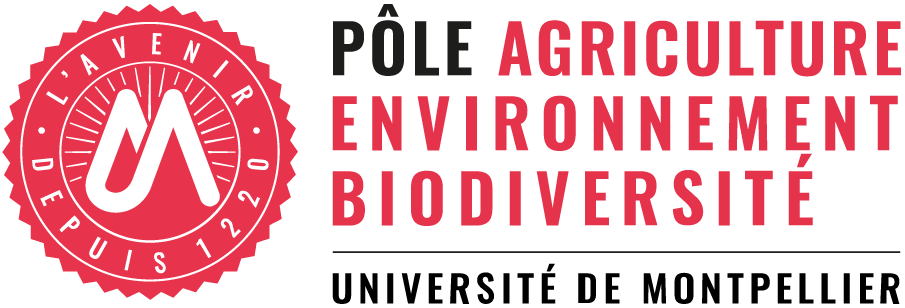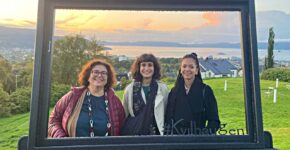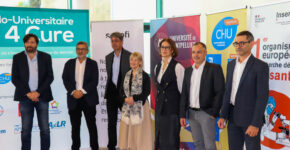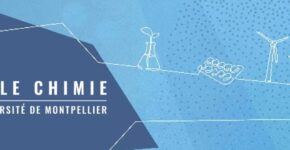Agriculture-Environment-Biodiversity Division (AEB)
Created in December 2017 as part of the MUSE foundation, it was set up as an intermediary structure of the University of Montpellier when the latter was created as an experimental public establishment in 2022.
It is a place where research structures can work in synergy and scientific consultation to develop joint actions between the members of the I-Site.
The cluster brings together over 3,000 permanent staff from research organizations such as BRGM, CIRAD, CNRS, IFREMER, INRAE and IRD, as well as higher education institutions such as the University of Montpellier, Institut Agro / Montpellier SupAgro and CIHEAM-IAMM. Every year, it publishes around 600 theses.
Cluster governance
Director, Agriculture-Environment-Biodiversity Division : Daniel Barthélémy
Deputy Director, Agriculture-Environment-Biodiversity Division : Rutger de Wit
Administrative and management assistant: Yasmine Lecuyer
Administration and Long-Term Thematic Projects Manager: Aude Montout
Responsible for the Human Resources Commission (CRH) Biologie Agrosciences: Pierre Czernic
Responsible for the Human Resources Commission (CRH) Biologie Agrosciences: Sabrina Lecourt
Head of the Human Resources Commission (CRH) Biology, Ecology, Evolution, Environment, Earth and Water Sciences : Mathilde Dufaÿ
Head of the Human Resources Commission (CRH) Biology, Ecology, Evolution, Environment, Earth and Water Sciences : Yasmine Lecuyer
Cluster Office
The AEB division has its own office, staffed by the director, deputy director and managers of the Long-Term Thematic Projects.
Strategic Orientation Committee (COS)
The Strategic Orientation Committee provides a link between Pôle de Research and its institutional partners. It participates in defining the Pôle de Research 's major scientific strategic orientations, and gives its opinion on the action plan proposed by the Director of the Pôle de Research.
Pole Council
The Conseil de Pôle issues advisory opinions on the direction and implementation of the Pôle's actions and strategy.
Human Resources Commission (CRH)
The Human Resources Commission deals with issues specific to the staff of the University of Montpellier. Each Human Resources Commission issues an advisory opinion, in compliance with the statutory provisions specific to the Professors and Researchers corps.
Key figures
- 37 Agriculture-Environment-Biodiversity laboratories
- 9 Service, research support, experimental or scientific platform units
- 9 Partner establishments
- 1 main doctoral school (GAIA Biodiversity, Agriculture, Food, Environment, Land, Water)
- 19ERC (European Research Council) projects underway in 2024
- 1800 Professors and researchers
- 175 theses defended each year
- 38 CIFRE contracts
- 1 UNESCO Water Centre ICIREWARD
- 1 UNESCO Chair in World Food
Missions
- Leading, communicating, highlighting scientific strategy and prospects
- Federating and fostering partnerships
- Increase the Region's visibility and contribute to its excellence in agronomy, the environment, ecology and biodiversity, both nationally and internationally.
- Promoting the link between Training and Research
- Promote collective reflection on platforms and infrastructures in conjunction with establishments and organizations
- Lead a collective reflection on concerted programming of jobs, skills and human resources in conjunction with establishments and organizations
Scientific scope
The cluster comprises 46 main research, experimental and service units and 10 secondary laboratories. It encompasses agricultural, environmental and water sciences, as well as ecology and evolution. Within these disciplines, it has 4 long-term thematic projects:
- Plant Adaptation to Global Change
- Agroecology and Food Systems
- Biodiversity, Ecology, Evolution
- Georesources, Risks and Societies(presentation doc)
Structured around these four interacting thematic fields, the AEB cluster forms a highly multidisciplinary whole, working on a wide range of issues and questions linked to the promotion of sustainable and ecologically innovative agriculture, food safety and security, the characterization, documentation, management and conservation of biodiversity, the structure and functioning of ecosystems, health and environmental quality, explicitly taking into account the impact of environmental and global changes, particularly climate change, on all these subjects.
Institutional partners
The Pôle AEB brings together staff from several research organizations:
- BRGM (Bureau de Recherches Géologiques et Minières - Geological and Mining Research Bureau)
- CIRAD (Centre de Coopération Internationale en Research Agronomique pour le Développement)
- CNRS (French National Center for Scientific Research )
- IFREMER (French Research Institute for Exploitation of the Sea)
- INRAE (French National Research Institute for Agriculture, Food and the Environment)
- IRD (Institute of Research for Development)
or higher education :
- University of Montpellier
- Institut Agro (Institut national d'enseignement supérieur pour l'agriculture, l'alimentation et l'environnement) /Montpellier SupAgro
- CIHEAM-IAMM (Centre International des Hautes Etudes Agronomiques Méditerranéennes-Institut Agronomique Méditerranéen de Montpellier)
It also maintains close links (and even hosts staff in its laboratories) with other research organizations such as INRAP (Institut National de Recherches Archéologiques Préventives) or INRIA (Institut national de recherche en sciences et technologies du numérique), or higher education institutions: AgroParisTech (Institut des Sciences et Industries du Vivant et de l'Environnement), ENSCM (Ecole Nationale Supérieure de Chimie de Montpellier), ARMINES ParisTech (IMT Mines Alès), EPHE (École Pratique des Hautes Études), UPVM (Université Paul Valéry Montpellier), UPVD (Université Perpignan Via Domitia), Université d'Avignon, Université des Antilles, Université de la Réunion, Centre Universitaire de Mayotte.
Research structures
- Institut Amélioration Génétique et Adaptation des Plantes méditerranéennes et tropicales (AGAP Institute)
- Botany and Plant Architecture Modeling (AMAP)
- Center for Functional and Evolutionary Ecology (CEFE)
- Bio-inspired chemistry and ecological innovations (ChimEco)
- Insect Diversity, Genomes and Microorganism Interactions (DGIMI)
- Plant Diversity, Adaptation and Development (DIADE)
- Water management, stakeholders and uses (G-EAU)
- Geosciences Montpellier (GM)
- HydroSciences Montpellier (HSM)
- Agropolymer Engineering and Emerging Technologies (IATE)
- Host-Pathogen-Environment Interactions (HPEI)
- Montpellier Institute of Plant Sciences (IPSIM)
- Montpellier Institute of Evolutionary Sciences (ISEM)
- Marine Biodiversity, Exploitation and Conservation (MARBEC)
- Montpellier Ecologie Evolution Biodiversité (MEEB)
- Infectious Diseases and Vectors Ecology, Genetics, Evolution and Control (MIVEGEC)
- Montpellier Environmental Research Observatory (OREME)
- Plant Health Institute of Montpellier (PHIM)
- An integrated approach to food quality - QUALISUD
- Sciences for Oenology (SPO)
Partnered research structures:
- Biodiverse agrosystems (ABSys)
- Agro-ecology and Sustainable Intensification of Annual Crops (AIDA)
- Water, soil and plant analysis (Analysis)
- Animal, Health, Territories, Risks and Ecosystems (ASTRE)
- Biomass, Wood, Energy, Bioproducts (BioWooEB)
- Center for Biology and Population Management (CBGP)
- DIASCOPE experimental unit (DIASCOPE)
- Functional ecology and biogeochemistry of soils and agrosystems (ECO&SOLS)
- Ecotron
- Forests and Societies
- Ecological functioning and sustainable management of banana and pineapple agrosystems (GECO)
- Agroecological functioning and performance of horticultural cropping systems (HortSys)
- Innovation and Development in Agriculture and Food (INNOVATION)
- Technologies and methods for tomorrow's agriculture (ITAP)
- Environmental Biotechnology Laboratory (LBE)
- Ecophysiology of Plants under Environmental Stress Laboratory (LEPSE)
- Laboratory for Soil - Agrosystem - Hydrosystem Interactions (LISAH)
- Unité Expérimentale sur les Systèmes Maraîchers Agroécologiques (Vegetable-growing UE0411 Experimental Unit on Agroecological Vegetable-growing Systems)
- Montpellier Interdisciplinary center on Sustainable Agri-food systems (social and nutritional sciences) (MoISA)
- Pech Rouge experimental unit (PECH ROUGE)
- Recycling and Risk
- Mediterranean and Tropical Livestock Systems (SELMET)
- Knowledge, Environment, Societies (SENS)
- Territories, environment, remote sensing and spatial information (TETIS)
- Vassal experimental unit (VASSAL)
structuring bodies and programs
Local :
- Four long thematic projects:
- Plant Adaptation to Global Change
- Agroecology and Food Systems
- Biodiversity, Ecology, Evolution
- Georesources, Risks and Societies
- Unesco International Water Centre(ICIREWARD)
- A scientific cooperation foundation: One Science Montpellier
- The Observatoire de Research Méditerranéen de l'Environnement(OSU OREME), part of the Observatoires des Sciences de l'Univers of the Institut National des Sciences de l'Univers du Cnrs.
- A Convergences Digital Agriculture Institute #DigitAg
- A "Territoires d'Innovation" Fablab(Occitanum)
- Unesco Chair in World Food
- Two Occitanie Regional Challenges: Biodivoc and Rivoc
Technology resources
- Environmental Trace Element and Isotope Analysis (AETE ISO)
- Food Technology Workshop (ATA)
- Water chemistry laboratory
- LAboratoire Mutualiséd'Analysedes Isotopes Stables de l'Eau (LAMA)
- Genotyping-Sequencing platform (GenSeq)
- Microbex platform
- Flow cytometry technical platform
Pricing






